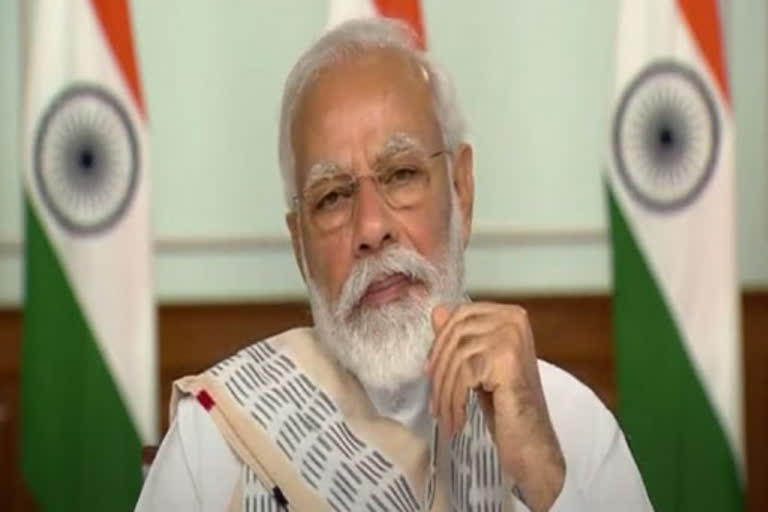Hyderabad: Mahatma Gandhi’s conception of self-reliance was of simple living and self-sufficiency. The basic idea was to use local resources and a local work force for the production of commodities for local consumption to the extent possible, with minimal dependence on the outside world. But the Indian government’s clarion call for ‘Atmanirbhar Bharat’ (self-reliant India) has not been matched by steps towards either simple living (especially for the middle and rich class) or local self-sufficiency. After perhaps one of the biggest and strictest lockdowns in the world owing to the coronavirus disease (COVID-19) pandemic, the recently announced relaxations and relief measures aimed at rebooting the economy are likely to take us even further away from the Gandhian value of self-reliance.
In the last couple of months, COVID-19 has shown us how inextricably public health and the economy are linked. Despite the private health sector in India having more ventilators, doctors and hospital beds than the public healthcare sector, it has essentially been public healthcare which — though chronically underfunded and neglected — has been bearing the brunt of the pandemic. The private sector has either been found playing it safe by ‘distancing’ itself from its patients or busy making profits even in this time of humanitarian crisis.
The lockdown has been in force to varying degrees for over two months now, albeit with little consensus on its effectiveness in the absence of concerted government action to build greater healthcare capacity to fight the disease. Because of this disruption, the economy is in a state of chaos. Businesses and industries are failing, and unemployment, hunger and destitution are on the rise. With no clear resolution to the problem in sight, some are predicting economic catastrophe. These events have been a demonstration of how the sustainability and resilience of any economy are hinged on the strength and equitability of its public health system.
The only rational long-term response to this crisis would be to make foundational changes in both our economy and our health system. We must build an economic system which is geared towards distributing wealth and resources more equitably to ensure the right of all people to a secure and dignified life, even during difficult times. We must strive to develop a healthcare system which provides access to quality health services to all, irrespective of social or economic standing. Both will require discarding neoliberal policies and their underlying capitalistic logic, which inevitably put profit over people, even when the very survival of humanity is at stake.
Read:Focus on poor, improve overall healthcare to combat COVID-19: Researchers
It is therefore ironic that the government’s plan to revive the economy includes spending INR 8100 crores to boost private sector investment in social sector infrastructure creation like hospitals and schools. The gates have been opened even wider for private sector investment in the defence, power, space and coal and mining sectors. Despite a strike last year by workers of the Ordnance Factory Board — the world’s largest government-operated defence production organisation — which had stalled attempts at its privatisation, the government recently declared its decision to corporatise the company while announcing a string of economic stimulus measures. Several state governments have moved to suspend labour rights with the hope of attracting investment and recovering lockdown losses. In a bid to improve healthcare facilities, the NITI Aayog has asked states to accelerate the process of setting up of medical colleges on the PPP model and augmenting district hospital facilities with help from private partners. A move which had been criticised as counterproductive even when it was originally proposed a few months ago.
To add to the all-round absurdity, Prime Minister Narendra Modi described this economic stimulus package as part of his “Atmanirbhar Bharat Abhiyan”. It is unclear what stretch of imagination allowed him to view upgrading the foreign direct investment (FDI) limit in defence manufacturing from 49% to 74% as a move towards self-reliance. Former health secretary K Sujatha Rao, in a tweet chiding the NITI Aayog for further privatising public health facilities asked if their definition of Atmanirbhar was “handing over government hospitals to private sector along our tax money” and exhorted them to “wake up” and “look out of your window”.
The government has clearly learnt nothing from this crisis and is keen to go ahead with business as usual. In fact, it appears to be taking advantage of the crisis to push its neoliberal economic agenda much further than would have been possible in normal times, with the full support and encouragement of the capitalist lobby.
Read:In the post coronavirus world, what will be the new normal?
Inviting foreign direct investment is part of the economic policies of privatisation, globalisation and liberalisation which are responsible, if not directly for the spread of the virus, certainly for the mismanagement and insensitivity which have characterised the response of many countries around the world. One striking example of this is how Indian migrant workers had to undertake gruelling journeys on foot on highways, or worse, railway tracks, merely because the government was under pressure from the private industry to not let them leave. The continuing power and influence of this dehumanising ideology, even in the face of the harsh truths brought to light by the current crisis, should send the alarm bells ringing for all of us.
